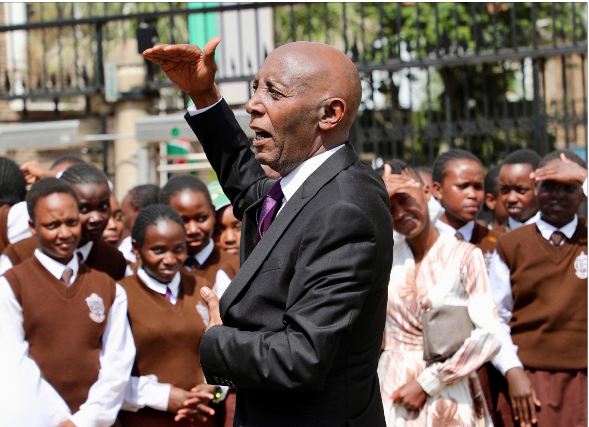
 Limuru MP John Kiragu takes Limuru Girls High School students on a tour of Parliament /HANDOUT
Limuru MP John Kiragu takes Limuru Girls High School students on a tour of Parliament /HANDOUTParliament was last week a beehive of activities, following a visit of more than 30,000 students from over 100 schools.
In an unprecedented wave of visits, schoolchildren from across the country turned the chambers into a classroom.
The visits seek to help the children learn more about governance and the process of making laws.
The primary and high schoolers' faces beamed with excitement as many of them met their representatives, for the first time, face-to-face.
The number of students increased as Parliament works to rebuild its image after Gen Z protests that painted it as out of touch with the people.
Leading the charge is National Assembly Speaker Moses Wetang’ula, who said reconnecting with the youth is not just symbolic—it is essential.
“Parliament is not just a law-making chamber; it is the people’s house,” he said.
“By opening our doors to students, we are growing the next generation of responsible, informed leaders.”
Wetang’ula said the programme is already helping to restore trust in institutions.
“When students walk these halls, see their leaders in action, and witness how House business is conducted, they realise this House exists to serve them,” he said.
On Tuesday, Parliament hosted more than 70 schools—a record for a single day.
Parliamentary orderlies worked seamlessly to keep everything running smoothly.
Designated rest areas, snack zones and photo spots were set up across the precincts, with staff on hand to guide students throughout the tour.
One teacher described the 18-hour trek from northern Kenya as a small sacrifice for a “once-in-a-lifetime opportunity.”
At least 100 schools have already taken part this week alone, and more are lining up, according to the communications office.
During the visits, students not only observe but they sit in on live sessions, interact with MPs and ask questions about lawmaking, policy and national issues.
Mary Achieng’, one of the teachers, described the experience “a game-changer.”
“Parliament is no longer just a building they see on TV. Now, they understand it—and believe they belong here,” she said.
Lawmakers have embraced the initiative.
Rarieda MP Otiende Amolo called it “a masterstroke in civic education.
Stephen Apopo, director in the Speaker’s office, said the results speak for themselves.
“Students arrive curious and leave inspired. They ask tough, smart questions. That’s how you build ownership of democracy,” he told the Star.
Wetang’ula revealed plans to institutionalise the programme into an annual civic education drive with structured debates, mentorship forums and learning materials.
“Parliament belongs to every Kenyan. By engaging our young citizens now, we are planting seeds of responsibility, integrity, and love for our country,” he said.
INSTANT ANALYSIS
Students visit Parliament to learn about the legislative process and how laws are made. They also gain a deeper understanding of the roles and functions of parliamentarians and the different branches of government. These visits often include guided tours, interactions with parliamentary staff, and sometimes even observing parliamentary proceedings.












